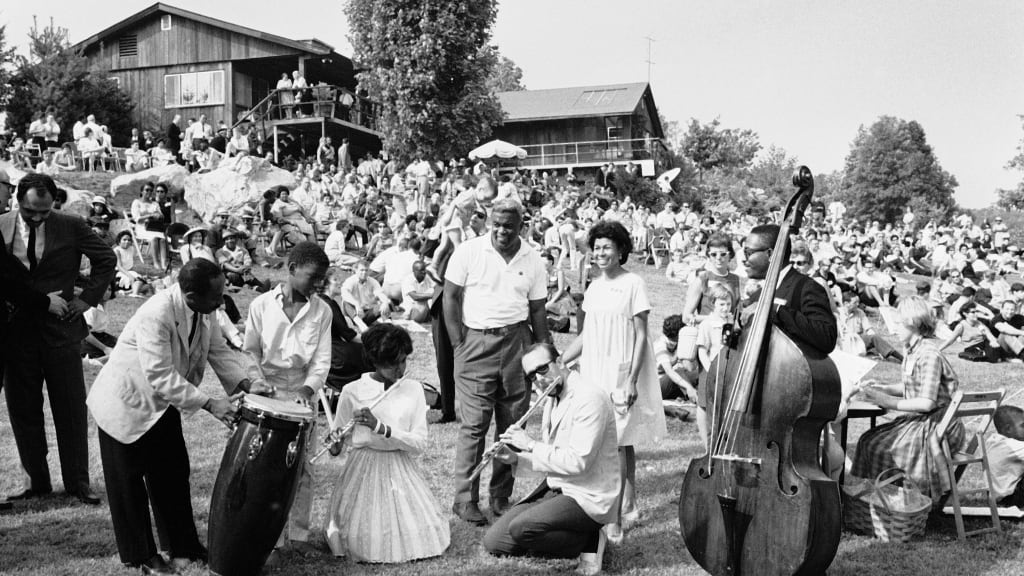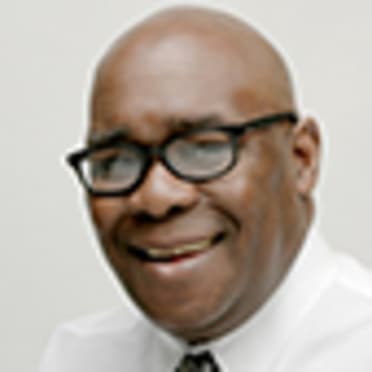A version of this story was first published on April 15, 2020.
NEW YORK -- Jackie Robinson had a baseball career for the ages. Much of that we know. It starts, of course, on April 15, 1947, when he became the first African American to break the color barrier and play in the Major Leagues, where his skill made him one of the best to play the game. He was a stellar defender and had dazzling speed and a bat that helped the Brooklyn Dodgers win six pennants and one World Series title during his 10 years in MLB. His impact was felt right away, as evidenced by his 1947 National League Rookie of the Year Award and the '49 NL MVP Award just two years later.
His push for change, however, was never confined within the walls of a ballpark.?
Starting in 1957, Jackie was vice president of personnel for the coffee company Chock full o¡¯Nuts. If an employee had a complaint, he was the guy to talk to. That same year, Robinson started getting heavily involved in the Civil Rights Movement, looking for equality for all African Americans. He spent a lot of time raising money for the National Association for the Advancement of Colored People (NAACP) and the Southern Christian Leadership Conference (SCLC).
For Robinson¡¯s daughter, Sharon, who was just 7 years old when her father retired from baseball after the 1956 season, this is the impact that resonates most.
¡°It lasted 14 years,¡± Sharon told MLB.com earlier this year. ¡°Those are the memories that are most vivid in my mind. I was too young to appreciate his baseball playing career, but I understood that baseball gave him a platform and satisfied his desires to play professional sports. He had a love for the game. But when he retired from baseball, he was working in New York City with regular hours, which meant he was home for dinner.
¡°At the dinner table, the focus was on the Civil Rights Movement. So when he retired from baseball, he was excited to participate in the Civil Rights Movement in a different kind of way. It was built into his contract with Chock full o¡¯Nuts that he could spend as much time as needed with the Civil Rights Movement.¡±
In his first year with the movement, Jackie crisscrossed the country and helped to raise $1 million for the NAACP. By the early 1960s, Robinson raised money for SCLC by hosting jazz concerts in his backyard. The funds were raised to help provide bail money for the jailed activists.
The first concert occurred on June 23, 1963, at the Robinsons' six-acre home in Connecticut, and what a lineup Jackie had that day. According to Sharon, Duke Ellington, Dizzy Gillespie, Billy Taylor and Dave Brubeck made appearances. It cost $10 to see the show, and Robinson was able to raise more than $14,000 that day. Jackie made an additional $1,000 because Sharon, younger brother David and other family members sold sodas and hot dogs. Martin Luther King Jr. attended the event and spoke to the crowd about sacrifice.

Jackie and his family also participated in Civil Rights marches. He was on the front line during the famous ¡°March on Washington¡± on Aug. 28, 1963, that culminated with King¡¯s unforgettable ¡°I Have a Dream¡± speech.
It is on that date this year that Major League Baseball will celebrate Jackie Robinson Day, which normally takes place each April 15th. It will occur during what has been a summer of protests and movements seeking to address racial inequality, police brutality and systematic racism.?
Robinson also wrote newspaper columns for the New York Post to support the movement, at times challenging Malcolm X. Robinson, whose baseball career was defined by his ability to not respond to threats or taunts and to let the power of his play and his dignity prove he belonged, felt the fight for equality should be done peacefully -- with purpose and determination -- not violence.
¡°My dad was the one that was traveling south and coming back and sharing stories,¡± Sharon said. ¡°People from the movement would call. We would hear the conversations, or he talked about it at the dinner table.¡±
Robinson¡¯s impact was felt in local communities, as well, where he championed economic development. He helped start the Freedom National Bank, which was located in Harlem during the mid-1960s.
¡°He was always an entrepreneur,¡± Sharon said about her father. ¡°During his playing days, he was part-owner of a clothing store in Harlem. Back then, players had jobs during the offseason. It¡¯s not like they went to the gym and kept in shape. They went to work.¡±

In 1972, the season that was the 25th anniversary of his breaking the color barrier, Robinson attended Game 2 of the World Series between Reds and Athletics. Before throwing the first pitch, he was on the field with his family and spoke to the 53,224 fans at Riverfront Stadium about his desire to see a black manager in baseball. Robinson did not live to see that wish granted; he passed away nine days later from a heart attack. The Indians named Frank Robinson their skipper for the '75 season.
Had he lived, how would Jackie react to that historical day in Cleveland?
¡°He would have been proud of it. But that wouldn¡¯t have stopped him from saying, ¡®OK, that¡¯s really nice. We have one now. But we have to move into ownership,¡¯¡± Sharon said. ¡°That¡¯s the kind of guy he was.¡±
